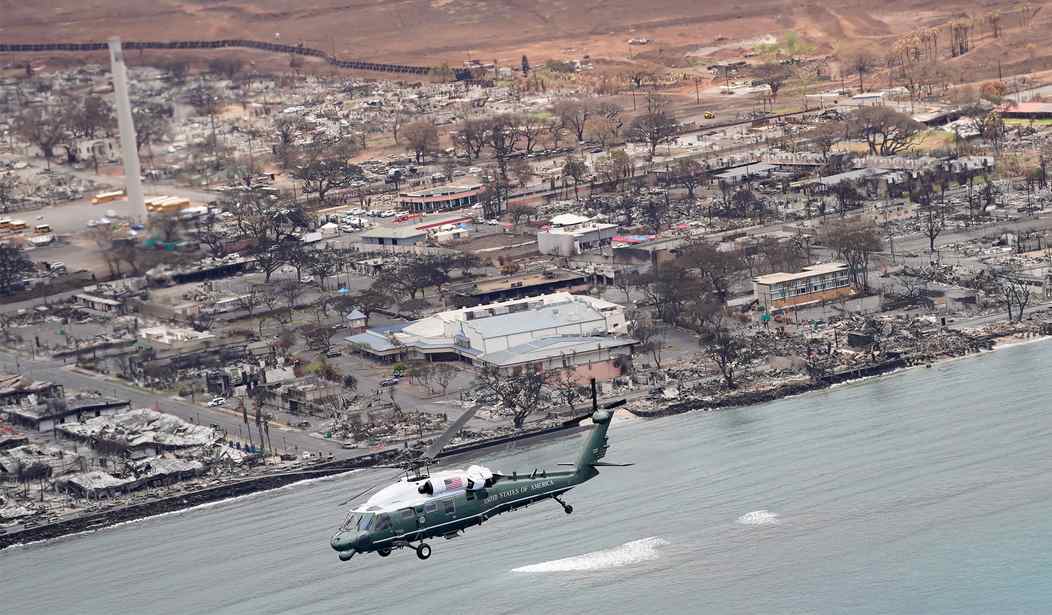It appears the American Society for the Prevention of Cruelty to Animals (ASPCA) might be grifting again. The organization, which purports to rescue animals in need, has a history of being accused of engaging in deceptive and questionable fundraising practices. Now, it has come under fire for trying to use the disaster in Lahaina, HI, to fill its coffers.
The devastating fires in Hawaii have not only brought about tremendous loss of human and animal lives, but they have also exposed shady practices on the part of some organizations seeking to profit off of the disaster.
Humane Watch, a watchdog organization that monitors the animal rights movement, published a piece in which it highlighted the ASPCA’s supposed rescue efforts in Maui. It noted that “there are those who seek to exploit emotions and raise money” using the fire. The article alleges that the ASPCA ran ads painting a misleading picture about the organization’s activities on the ground in the region.
Today and yesterday we saw a fundraising ad for the ASPCA on Facebook. The ad claimed the ASPCA is “on the ground in Hawaii assisting with animal search and rescue efforts” and “searching for displaced animals.”
There’s one key detail missing from the ad: Animal rescuers are not currently in the burn zone at all. So how exactly is the ASPCA “searching for displaced animals”?
According to news reports, there’s only one paved road in and out of Lahaina. The town is on the northwestern part of Maui and essentially partitioned off from the rest of the island by a mountain and forest preserve.
Meanwhile, Hawaii’s emergency management agency has blocked all animal rescuers from operating in the contained disaster zone. These rescuers are now going to the media, pleading to be let into the disaster area. Hawaiian government leaders have said they have not seen any stray animals in the area, but rescuers have argued that cats, for example, hide and come out at night when they are under duress in a situation like this. (And they’re right.) But the government’s priority at the moment is apparently to keep people out of the area and prioritize recovering humans.
So how exactly is the ASPCA “searching for displaced animals”? Where, exactly? In the eastern part of Maui, where there is no fire?
The article referenced a Facebook comment that prompted the organization to admit that it is not authorized to operate in the disaster zone for animal search and rescue. “At this time we unfortunately are not authorized to access the burn area to conduct animal search and rescue,” the ASPCA wrote in response.
This is not the first time the organization has been accused of using disasters for fundraising while actually doing very little work. Animals 24-7 also published a piece taking the organization to task for its past and present grifting activity:
As to the ASPCA fundraising appeals, [animal disaster responder Mike] Merrill told ANIMALS 24-7, “We saw that after the Kentucky tornado. They [the big organizations] all came in for one day, pulled a few dogs, and left, then did ad campaigns for the next two months. Same thing in Ukraine,” where Merrill was involved in animal rescue operations for ten days after the February 2022 Russian invasion.
“The big organizations raised a ton, and the small boots on the ground groups struggled,” Merrill finished.
The ASPCA has been under scrutiny for years because of how it solicits donations and spends the money it rakes in from donors:
The [Center for the Environment and Welfare] released a report detailing its findings about how the ASPCA engages in practices some would find questionable at best. The authors wrote:
While nearly 1 million animals are euthanized each year in the U.S., the ASPCA is paying its executives huge salaries and sitting on hundreds of millions of dollars–including millions socked away in the Caribbean.
According to its most recent tax filings, in 2021 the ASPCA had $390 million in revenue and $575 million in assets, including $310 million in investments and $105 million in savings. The ASPCA has about $11 million in offshore accounts in the Caribbean.
The same filings show that only about 2% of the ASPCA’s budget is given as grants to community pet shelters. The ASPCA’s grants to pet shelters in 2021 are only about half of the money the ASPCA reported keeping in the Caribbean.
There is a term for this particular type of grift: “Disaster capitalism.” This is a practice in which organizations exploit disasters and tragedies to generate revenue without actually providing much in the way of benefit for those affected. In so doing, they undermine the work being done by smaller groups who are actually doing the work they advertise.
This situation conveys why it is so important to vet each organization to which one donates. Unfortunately, too many of these outfits are not what they claim, and it is possible that your generosity might be going to someone’s bank account rather than the cause you wish to support.












Join the conversation as a VIP Member